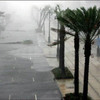Chi, I am so glad to know your brother is safe.
I hope Diego got out too. And Otter swimming away with the chihauhaus on her head!!
Today's beautiful article in the Times about the New Orleans spirit:
August 31, 2005
Where Living at Nature's Mercy Had Always Seemed Worth the Risk
By PETER APPLEBOME
After Hurricane Andrew huffed and puffed and then somehow veered away in 1992, the way the storms always seemed to do, the manager of a praline shop in the French Quarter mused on the mixture of fatalism and bravado that has always been at the heart of New Orleans.
"You do live with the belief that some day the big one's going to get you," said Patricia McDonald Gomez, general manager of Aunt Sally's Original Creole Pralines said as the party resumed, as it always did on Bourbon Street. "You're almost fatalistic, which is part of the reason New Orleans has that mixture of frivolity and fatalism. Living in a soup bowl will do it to you, like Romans dancing while Nero fiddled and the city burned."
Now it seems, after countless close calls, the big one has hit, leaving New Orleanians terrified, stunned, gasping, speechless.
With whitecaps on Canal Street, water coursing through breeched levees and 80 percent of the city under water, surviving, not rebuilding, is now the order of the day. But in the back of their minds people who love New Orleans are wondering what will remain physically and psychologically of perhaps America's most distinctive city when the water recedes and - days, weeks or months from now - some semblance of everyday life struggles to resume.
So former Mayor Marc Morial, now the head of the Urban League and living in New York, kept interrupting a telephone conversation to gasp in disbelief at the watery images on his television and then did his best to conjure up the task ahead.
"We'll rebuild, of course," Mr. Morial said. "But what made New Orleans is the polyglot, the tapestry, the mosaic, the gumbo. So the French Quarter gets most of the attention, but the Quarter feeds from the arteries of the neighborhoods."
He paused and gasped again as the screen showed the flooded images from the low-income Ninth Ward: "Oh my God, oh my God. We're looking at the worst natural disaster in American history."
Left unspoken was the question not of how to rebuild the French Quarter, but how to rebuild the city of Stella, Blanche and Stanley, the city that to William Faulkner was "the labyrinthine mass of oleander and jasmine, lantana and mimosa," a place one admirer said "could wreck your liver and poison your blood," the city of the Italianate mansions of the Garden District and forlorn housing projects like the one named Desire - a place that gave America most of its music, much of its literature, a cracked mirror glimpse of American exotica and a fair piece of its soul.
"Great Babylon is come up before me," shuddered Andrew Jackson's wife, Rachel, upon encountering New Orleans more than a century and a half ago. "Oh, the wickedness, the idolatry of this place."
In truth, the wickedness has long since become fairly tame, pre-fab voodoo, L.S.U. and Ole Miss sorority girls flashing their breasts from French Quarter balconies and sad-eyed strippers being ogled by drunk conventioneers at seedy Bourbon Street bars. And people have been predicting the slow de-Babylonization of New Orleans for decades, pondering its inexorable transformation into a place like anyplace else.
But it never really happened. Mr. Morial said that was partly a function of its identity as a city of natives, who make up 70 percent to 80 percent of the population. It is partly a function of its in-bred business climate, suspicious of newcomers, in which the go-go gene that defined cities like Dallas or Atlanta, petty trifles when New Orleans was at its peak, never took hold. And partly it is a function of geography, the proudly insular culture that results from what one scholar, Pierce Lewis, described as being an "inevitable city on an impossible site."
So, as much as the oysters at Felix's or the street performers in Jackson Square, what has defined New Orleans has been nature - the smothering blanket of humid air, the rains so thunderous, the humorist Roy Blount Jr. once wrote, "that you expect to see alligators bouncing off the pavement." And most of all, the oceanic expanse of water surrounding the city from the Mississippi River and Lake Pontchartrain, which covers 600 square miles. That location made it a natural settlement point, a place that drew settlers from every culture that passed by and left it in a place so precarious that this week's disaster has always seemed almost inevitable.
Mr. Morial said city planners had been as attentive to hurricane planning as possible and cited the city's shift in focus from shelters to evacuation planning as something that could play an incalculable role in minimizing the casualties from the storm.
As for any psychological denial, he noted that other places face earthquakes or floods, and people in New Orleans have always looked at the odds and figured living at nature's mercy in such an alluring hothouse was worth the risk.
"People have always thought, there's a chance for the big one, but is it one in 100? One in 1,000? One in 10,000? One in 100,000?" he said. "People have sort of learned to deal with this and live with it, and now we're all having to deal with it."
Even those who survived the storm with minimal damage were wondering what would happen next in a city whose other dominant thread is entrenched urban poverty.
Henry Armand Austan, a 61-year-old photographer, said he picked out his home in the city's Carrollton section uptown because it stood on some of the highest ground around.
Yesterday afternoon Mr. Austan had no electricity, but he did have gas and water. He had a clutter of downed banana trees in his backyard, a posse of hungry cats looking for food, a view of looters foraging through shops nearby, and a fiancée whose cellphone had died stranded at the Louisiana Superdome. The foot of water that was in front of his house a day earlier had drained down to the flooded sections below.
"We had a good tourist thing going, but if this place is closed down for six months you can forget that," he said by telephone. "If they don't come back, you wonder what will happen. This is a poor city with a bad education system. Corporate America isn't going to want to put its business in a place that might flood every so often. We might not have a lot to recommend us."
Some fear that the city that emerges from the floodwaters will finally be turned into a theme park - the glitter of Bourbon Street without the grit that now surrounds it.
But there is also a sense that, like the river, there remains something immutable in New Orleans. As the jazz patriarch Ellis Marsalis once said: "You know, I don't think New Orleans is ever going to change, because I don't think in the scheme of things, it's supposed to change."
That sentiment will be tested now as never before, but Mr. Morial said he was confident the city could rebuild and recover.
"I've heard from so many people and everyone says the same thing," he said. "First they say, 'How's your mom? Is she O.K.?' Then they say, 'We've got to do something to help.' A lot of people have lost everything they own, but there's a great spirit, a zeal, to clean up and to rebuild."


